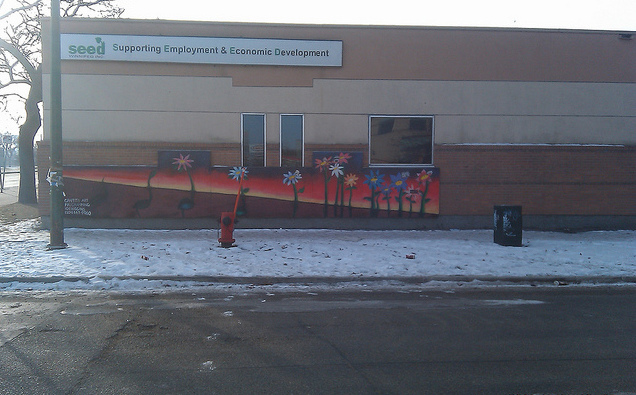rabble is expanding our Parliamentary Bureau and we need your help! Support us on Patreon today!
I teach in the department of Urban and Inner City Studies at the University of Winnipeg. Our program is located on Selkirk Avenue in Winnipeg’s North End. A large number of our students have grown up poor. Some have not known anything but poverty. Others come from the suburbs to learn about urban and inner city issues from a different perspective. The diversity in our classrooms leads to some very interesting discussions.
Last week one of my students spoke about her experience growing up in the North End. She described the difficult realities of growing up in a poor neighbourhood, but she also described the importance of the many community-based programs that helped her through. She said if not for these programs, she would not now be in university. It was a powerful presentation by an intelligent young woman who is now thriving in university with a bright future ahead of her in spite of many challenges.
A few days later I read the Winnipeg Free Press editorial responding to the 2015 Campaign 2000 Child and Family Poverty Report Card (Selinger gives poor answer to bad report card on poverty, November 25, 2015). The report card shows Manitoba to be doing particularly poorly compared with other provinces. This is disappointing news and the reasons for this need to be further investigated so that we can know better who is poor, where poverty in Manitoba “lives” and what different levels of governments should do. For example, we know that Aboriginal people are over-represented among those who are poor and federal government support in Manitoba’s First Nations is abysmal — something the Report Card did not acknowledge.
But aside from the discussion about poverty itself, it was a particular statement in the editorial that I found especially troubling. The editors note that “the Selinger government has become adept at shipping tax dollars to a variety of community groups and organizations.”
It isn’t the first time that the Free Press has advanced the narrative that too much money is being spent on community-based programs. In 2014 Mary Agnes Welch (Generosity doesn’t solve poverty, December 17, 2014), criticized the Selinger government for its support of the so-called “poverty industry,” and stated that “many of these programs overlap. There is little measurement of outcomes, so we don’t know what really works.” I’m not sure what measurement Ms. Welch is looking for, but I propose that my student is an example of an important outcome and I know there are many others like her.
It is also ironic that while the editorials criticize the funding of community-based organizations, they have also often written extensively about the need to take action to prevent crime, homelessness and other social issues related to poverty. There seems to be consensus about the need for more recreation and afterschool programs for children and families living in poverty.
So how do these critics of government funding for community-based organizations think prevention happens? As my student very eloquently described from her personal experience, this is what community-based organizations do. Why wouldn’t we want our governments to financially support this work? And if they don’t, how do we expect organizations to provide these services? Do we think these services can and should be run by volunteers? Who are these volunteers with the time and resources to work for no pay?
It is true that there has been too much downloading of services to the community. But this trend began long before the Selinger government. It aligns with the ideologically inspired retrenchment of the state that emerged in the 1980s. I propose that we are all to blame for the growing poverty by our acceptance of the idea that governments can do more for less and that we are all better off if we pay less tax. The backlash against the NDP for the one per cent increase in the PST is a case in point.
Yes, the NDP government could be doing much more to address poverty. Yes, income assistance should be raised and all 52 of the recommendations put forward by Make Poverty History Manitoba should be implemented. Poverty is complicated and comprehensive solutions including increased income, accessible child care, housing, access to early learning programs, literacy and long-term training and education and many other services are needed.
But to criticize the Selinger government for choosing to invest in community organizations doing prevention work makes no sense. I’ve been an anti-poverty activist in this city for 20 some years. I see poverty every day. There is no one angrier than I am that we’ve yet to alleviate poverty. But to suggest that community-based organizations are a waste of money, which is the logical conclusion to the statement made in the Winnipeg Free Press editorial and previously by Welch is wrong-headed.
Alleviating poverty is a long-term proposition that requires multiple interventions. Community-based organizations are not going to solve poverty on their own, that’s for certain. But they are one part of the solution and they should be adequately funded to do their work.
My student is testament to this. She is still living in poverty — a living and breathing example of the very disappointing statistics. But she is also well on her way to getting out of poverty. And the many community organizations that supported her as a youth are one reason why.
Shauna MacKinnon is Assistant Professor in the Department of Urban and Inner City Studies at the University of Winnipeg and a CCPA MB Research Associate. This article first appeared in the Winnipeg Free Press December 4, 2015.
Photo: AdolfGalland/flickr
rabble is expanding our Parliamentary Bureau and we need your help! Support us on Patreon today!




